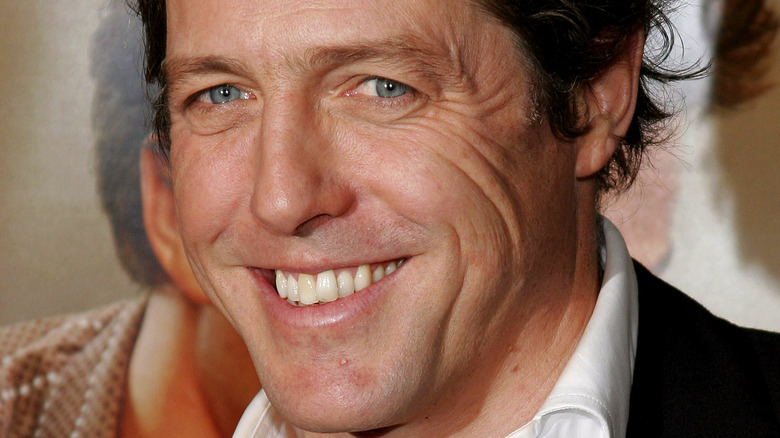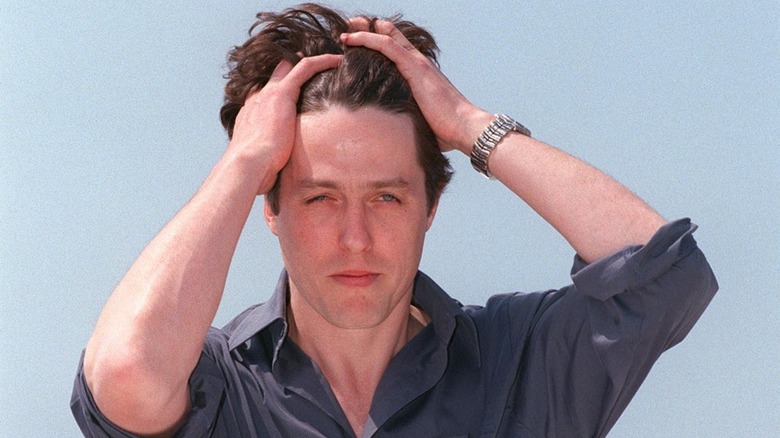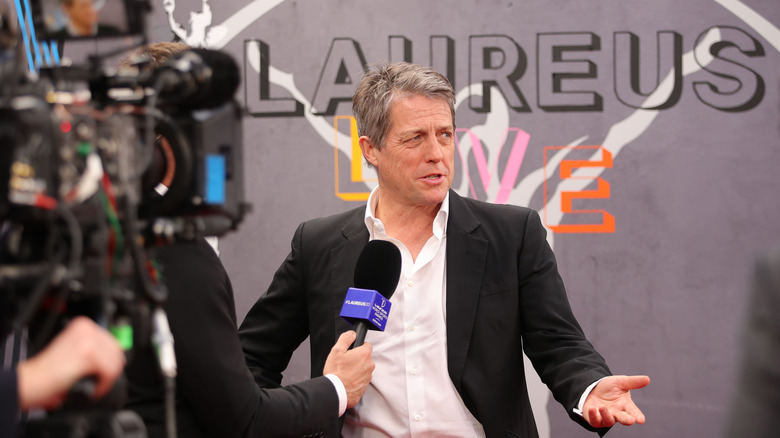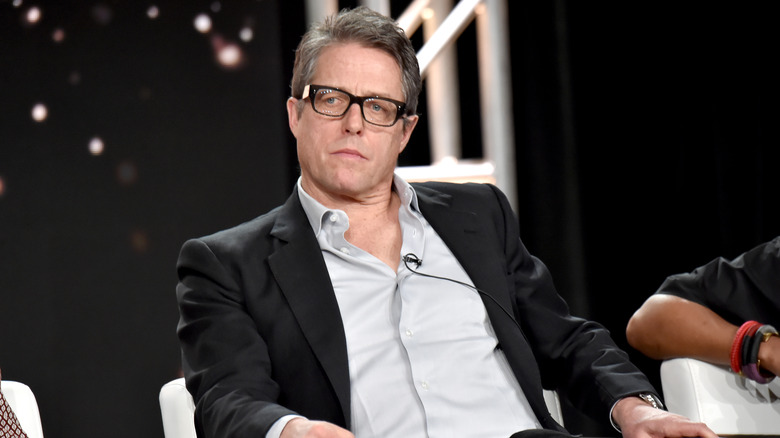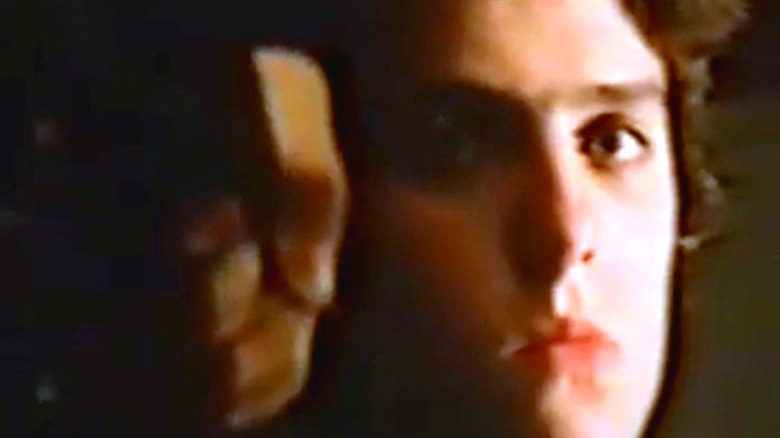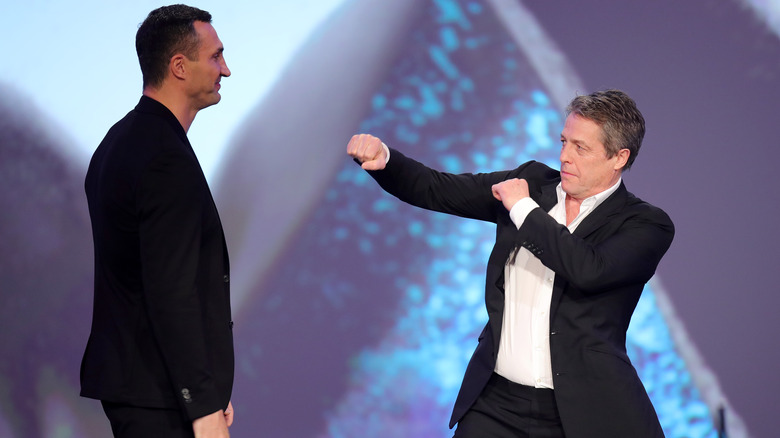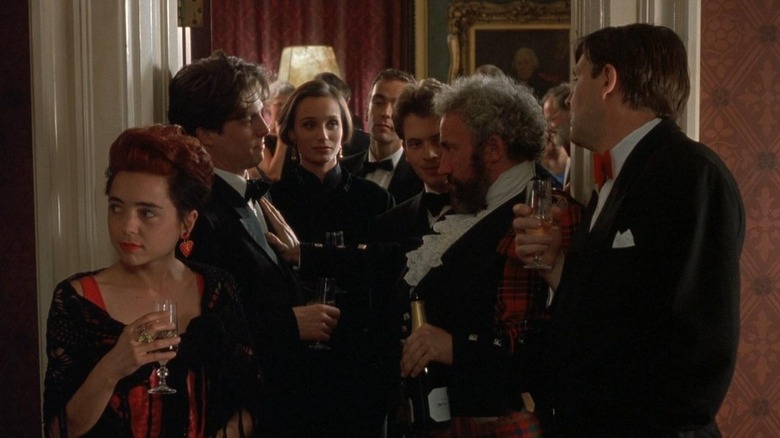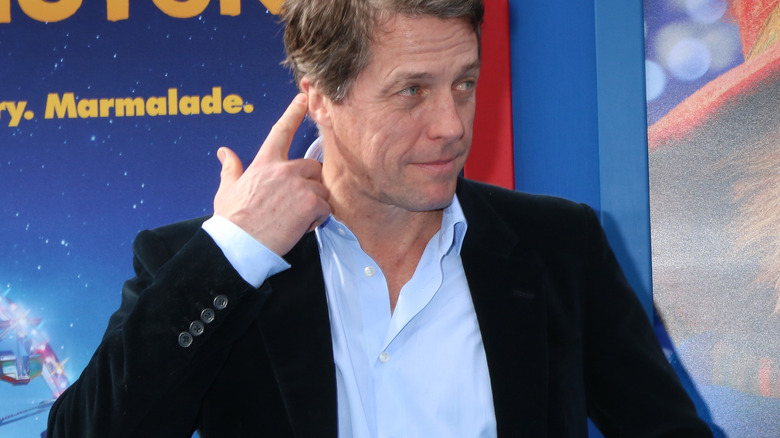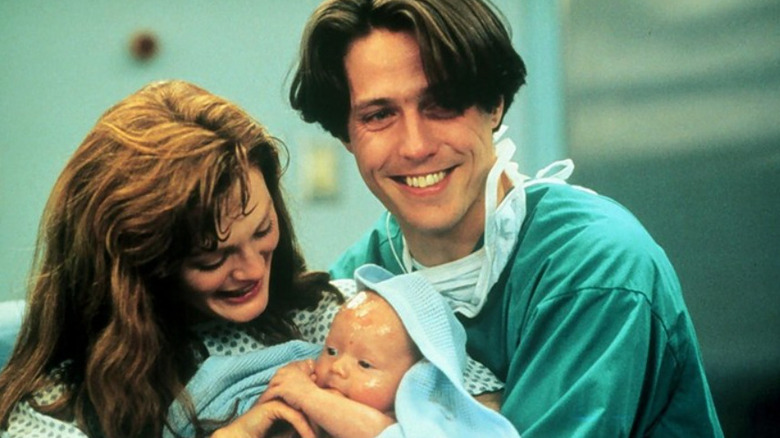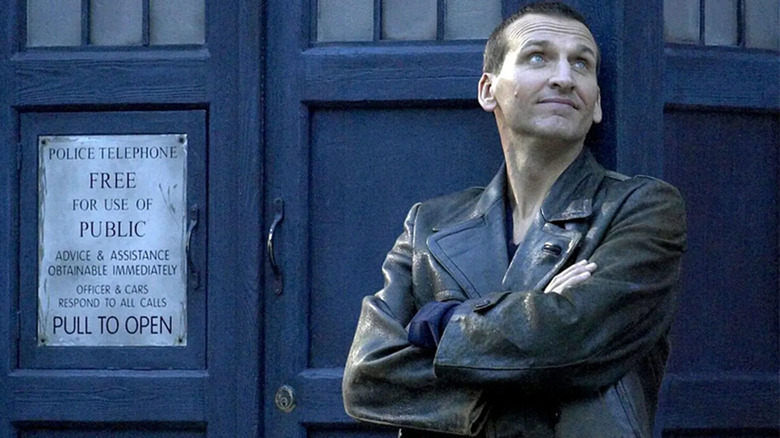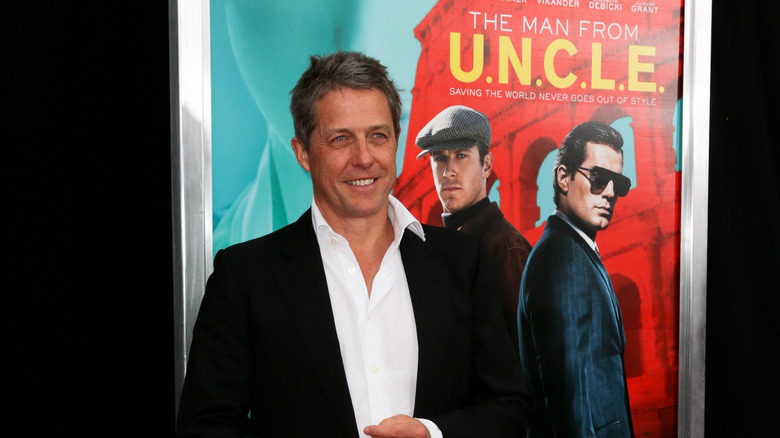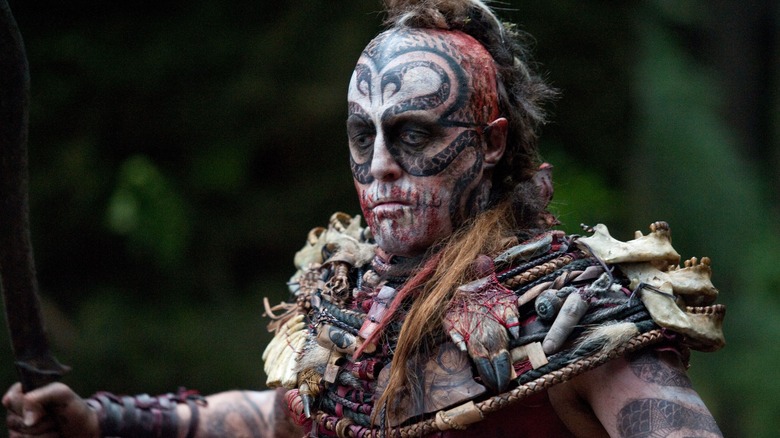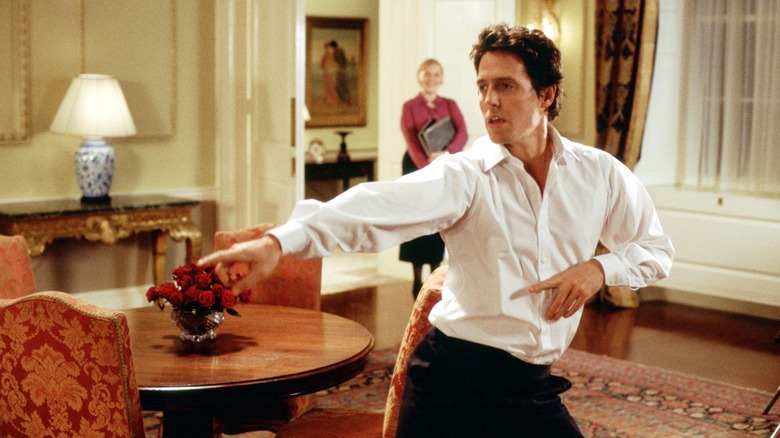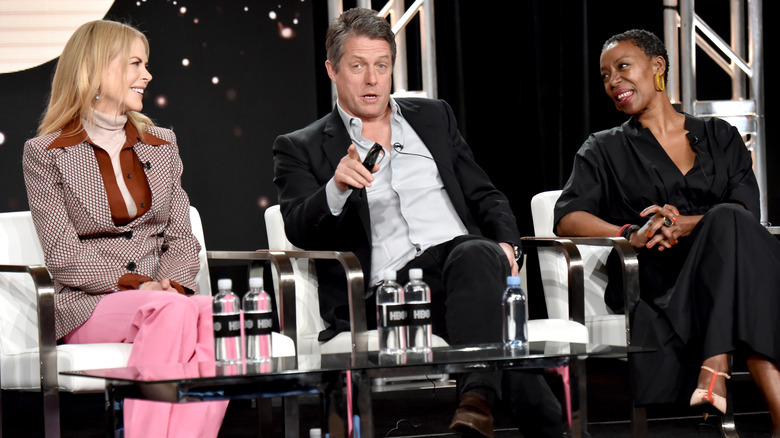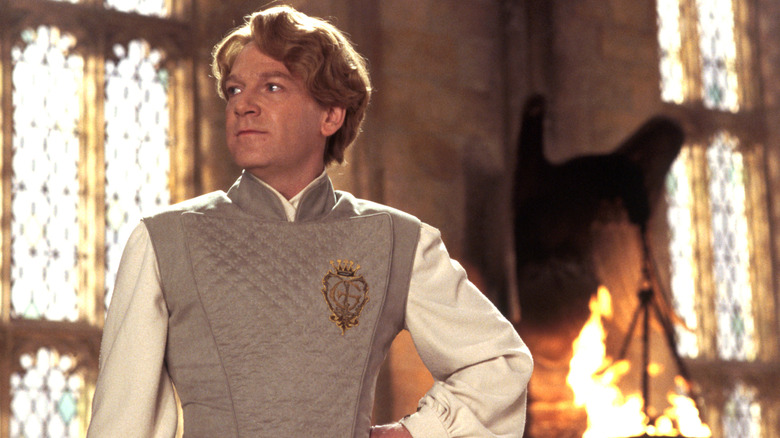The Untold Truth Of Hugh Grant
Before big-budget franchises came to dominate Hollywood starting in the late 2000s, there was a thriving sub-section of small- to mid-budget movies that could make healthy profits at the box office and also through DVD sales. Such movies relied on stars to draw in the audience rather than having the inbuilt fanbase of a franchise.
Hugh Grant was one such movie star who ruled the box office in the "rom-com" genre, from the mid-'90s to the early 2000s. Grant headlined classic films from that era, such as "Four Weddings and a Funeral" (1994), "Notting Hill" (1999), and "Bridget Jones's Diary" (2001). These films are still counted among the best romances the industry has ever come up with.
Known for playing handsome Britishers who have a hard time expressing their love for the movie's female lead, Grant came to define a new kind of "sensitive" movie star in an era that was dominated by macho action heroes and moody method actors. After experiencing a decline at the box-office with rom-coms, the actor later rebooted his career by taking up more character-based roles. Here are some facts about Hugh Grant that die-hard fans need to know.
Starting out with female roles
While Hugh Grant has seen a lot of praise for his acting skills in later years, his initial success as a leading man relied a great deal on his handsome looks. The actor managed to look good without being intimidating, and a lot of that had to do with his delicate features and slim build.
As it turns out, Grant's looks did not always make him the perfect leading man for romantic films. Once upon a time, the actor was frequently chosen to play the role of the female in the story. Grant attended London's all-male Wetherby School in his youth, where his striking looks were deemed perfect for playing female parts. "This was a necessity," Grant told Pride Source about dressing up as female characters to perform in front of his classmates.
"It was dictated that some of us had to become little actresses," he explained. "And, yes, I was particularly moving as Brigitta von Trapp, one of the von Trapp daughters, in 'The Sound of Music.'" The actor went on to explain that his looks were so feminine in his teenage years that he "used to go on a French exchange in Paris and all the locals called [him] 'mademoiselle,'" because they genuinely thought he was a girl.
A brainy guy
In his best-known rom-coms, Hugh Grant's characters are often endearingly inarticulate when it comes to expressing their feelings. But the actor behind the characters is far from inarticulate or dumb. In fact, Grant is probably one of the smartest actors to ever make it to the Hollywood A-list.
He won a scholarship to study at the prestigious Latymer School in London. While there, he represented Latymer Upper on the well-known UK quiz show "Top of the Form," which was an academic competition between two teams of four secondary school students each. After that, Grant won the Galsworthy scholarship at New College, Oxford, where he studied English literature and graduated with second-class honors.
The distinguished pupil's academic career seemed set to continue when Grant received an offer from the Courtauld Institute of Art, University of London to pursue a PhD in the history of art (via The Guardian). But by that time, Grant's talents as a performer had already started being noticed, thanks to his role in the student film "Privileged" (1982), produced by the Oxford University Film Foundation. Instead of going to Courtauld, Grant found himself embarking on a journey to becoming a world-famous actor.
The unglamorous side jobs
Once Hugh Grant decided to try his luck in the entertainment industry, he was faced with the same situation that so many aspiring actors deal with: having to do menial side jobs while waiting for his big break. In Grant's case, he embarked on a series of jobs that paid little but gave ample opportunity to practice balancing trays and wiping bathrooms.
"I was a very good waiter in a restaurant that catered to a gay clientele on the Kings Road," the actor told WENN (via Young Hollywood). According to Grant, he would receive a lot of tips by being flirty with his customers. While being a waiter is low on the totem pole of menial jobs, it was still better than the times the actor spent scrubbing toilets.
"I cleaned many lavatories," Grant declared in the same interview. "I was rather good at it." Still, being really good at cleaning toilets doesn't change the fact that you have your arm stuck inside a toilet, and the actor admits it was not a job he enjoyed doing. That said, Grant states that his worst job was as a driver because he crashed the car he was supposed to be driving and was consequently dismissed from his position.
The fuse that lit the fire
While at Oxford, Hugh Grant was active in the theater scene as well as in sports. His dashing good looks were noticed by many. One of the people who was impressed was fellow student and aspiring filmmaker Michael Hoffman. He approached Grant with the offer of a prominent role in his upcoming student film — an offer that Grant initially dismissed.
"I said no because I wasn't very interested in acting at that point," Grant confessed during an interview for BAFTA. "I'd done a couple of sort of plays, but it wasn't my main thing. And then I realized this girl who I really fancied called Victoria Studd was going to be in it, so I said, 'Oh alright, I'll be in it...'"
The days spent making the movie did not result in Grant and Studd becoming an item like he had hoped. But Grant's performance in his role was noticed by talent scouts who saw the film. They later contacted the budding thespian and advised him to try for a career in films and television.
His sketch comedy days
After deciding to try his luck at acting, Hugh Grant was faced with the question of finding actual work in the entertainment industry despite having zero connections or any idea how to go about getting roles in film or television. To get some sort of a foothold in the business, the aspiring actor took up a series of supporting roles in stage plays, from playing a tree to a background peasant in theater productions.
Naturally, doing such roles was not Grant's idea of meaningful work. As told in the book "Hugh Grant: The Unauthorized Biography" (via The Guardian), Grant took matters into his own hands by forming a sketch comedy troupe called "The Jockeys of Norfolk." As one of the main members of the troupe, not only did Grant get to play prominent comic roles and experiment with his acting range, but he also started writing and directing his own material.
More importantly for his future career, Grant's time in the comedy troupe allowed him to hone his comic skills and be seen as more than just a pretty face. It was this sense of comic timing that later proved so well-suited to the leading characters Grant played in his romantic comedies.
Fighting to get cast in Four Weddings and a Funeral
Nowadays, the best known Hugh Grant movies from his rom-com days are "Notting Hill" and "Bridget Jones' Diary." But before those movies pushed Grant's career into the stratosphere, it was 1994's "Four Weddings and a Funeral" that proved to be the actor's breakout hit and marked the arrival of a true-blue star.
In the movie, Grant played the role of Charles, an avowed bachelor who keeps meeting a striking young woman named Carrie (Andie MacDowell) at various social functions. Over an extended period of time, Charles comes to realize that he is in love with Carrie, even as he prepares to marry another woman. The role of Charles was played to debonair perfection by Grant, and his performance contains many of the famously bashful mannerisms that came to define the actor's roles and an entire era of romantic leads.
So it's surprising to consider that the writer of the movie, Richard Curtis, was pretty dead-set against casting Grant in the role of Charles. "[My audition for the film] was in front of Mike Newell, the director, who seemed to quite like me," the actor explained to Sky Arts' BAFTA: Life in Pictures (via Metro), "and Richard Curtis, who seemed to want me dead. He really hated me." Fortunately, Curtis eventually came around to Grant's casting, and the two worked together on many future projects.
Becoming his own agent
Over the years, Hugh Grant has developed something of a reputation for being difficult to work with. This extends to people who work with the actor both in front of and behind the camera. In one strange case, Grant found a way around having to work closely with an agent he might clash with by pretending to be his own agent.
"I was never any good at taking advice." Grant told James Corden when talking about his reason for parting ways with his former manager. "So I thought, 'This is nonsense and I could save a fortune if I was my own agent.' So, I invented a man called James Howe Ealy." The ruse worked, at least for a time, as Grant would message back and forth with his business associates pretending to be Ealy, and thus "saved a fortune" in management fees.
But the deception started to fall apart after a year or two, as Grant explained that he would occasionally in a drunken haze sign off on his messages as "Hugh" instead of "Ealy," until his associates started to suspect the truth. The actor further explained that he took such a risk out of a sense of indifference, because he had "had enough of acting for a bit." After getting back into the groove of things as a performer and taking on more character-based roles, Grant hired a proper manager once again.
Crashing and burning in Nine Months
Hugh Grant had been working steadily in smaller roles in British movies and shows ever since the late 1980s. But it was after the success of "Four Weddings and a Funeral" that Hollywood began to take notice of the handsome young actor who was sending women swooning all over the world with his self-deprecating charm.
As a result, Grant was cast in the lead in his first U.S. film, the 1995 romantic comedy "Nine Months" alongside Julianne Moore, Tom Arnold, Joan Cusack, Jeff Goldblum, and Robin Williams. Grant played the role of a first-time father-to-be who tries to help his wife deal with her nine months of pregnancy amidst comically turbulent challenges. The film made a decent amount at the box office, but it received mixed reviews.
Grant himself has since been quite open about his own shortcomings in the film. "I really ruined it," the actor said in an interview with the SAG-AFTRA Foundation, "and it was entirely my fault." Grant explained that making the jump to the big time with such a huge studio, a distinguished cast, and so much money on the line made him panic. "I just tried much too hard and, you know, I forgot to do basic acting things, like mean it. So I pulled faces and overacted. It was a shocker."
Turning down The Doctor
If the U.S. has "Star Trek" and "Star Wars," then the U.K. has "Doctor Who." The sci-fi series has been running in one form or another since 1963. The titular character of the show is The Doctor, an unnamed and alien "Time Lord" who travels the universe in his time-traveling ship and regenerates every few years with the face and personality of a different actor.
Playing the role of The Doctor is considered a high honor in British thespian circles. Back in 2004, the franchise was gearing up for a triumphant return to television with a fresh doctor and a massive new budget. In 2018, the showrunner of that era of "Doctor Who," Russell T. Davies, revealed that the main role on the show could have been Grant's for the taking. "I have always wanted to work with Hugh Grant," Davies told BBC. "Always. I literally offered him Doctor Who in 2004."
"I told him that," Davies continued, "and he was like 'really?!' He knew nothing about that. I love him. I think he's one of Britain's finest actors." Still, while fans never got to see Grant take on the role in the official series, the actor did play a version of the 12th Doctor in "The Curse of Fatal Death," a Comic Relief special, written by future "Doctor Who" showrunner Steven Moffat.
An undercover operation
Despite being one of the most good-looking and successful British actors to ever make it in Hollywood, Hugh Grant's name was never on the list of possible contenders to play James Bond. But while few could imagine Grant in the role of the suave and deadly master spy, he did engage in one real-life undercover operation of national importance.
Due to the high-profile nature of Grant's relationship with long-time partner Elizabeth Hurley, he often found himself fighting with members of the paparazzi who saw nothing wrong with invading his privacy. At one point, Grant came into contact with ex-News of the World investigative journalist and paparazzo Paul McMullan. The former journalist informed Grant that instances of phone-hacking of celebrities by the tabloids were far more widespread than anyone imagined.
Intrigued, Grant arranged to meet McMullan for an intimate conversation that the actor was secretly recording. The details of that meeting were later published in the New Statesman, and caused a scandal that rocked the UK. The resulting lawsuits against the accused tabloids became a historic win for privacy in the public sphere of the country. Grant himself was paid substantial damages for instances of phone hacking that had occurred on his private number.
No more rom-coms
Despite making his rise to stardom on the backs of romantic comedies, Hugh Grant has never been particularly fond of the genre. Plus, the shelf-life of a heartthrob is notoriously short. By the end of the 2000s, rom-coms starring Grant were no longer enjoying as much popularity as before. A new breed of hunky vampires and shirtless werewolves were ruling hearts instead.
Faced with declining prospects, the actor decided to go back to his roots as a character actor who could do more than look handsome and be confused by love. Grant appeared in a string of darker roles, from playing six villains in 2012's "Cloud Atlas" to a washed-up screenwriter struggling with divorce and depression in "The Rewrite" (2014).
The gamble worked, and in recent years Grant has had something of a career renaissance as a character actor in supporting roles with a dark edge to them. So does he miss the days when he was headlining his films as the king of rom-coms? Not in the least. "What I don't want to play anymore are stuttering British guys with disheveled hair that are confused by love," the actor told the German edition of InStyle (via Film-News). "Those times are definitely over."
The worst scene he ever filmed
Over the years, Hugh Grant has developed a bit of a reputation for being difficult to work with. But he is also known as a serious professional who takes pride in doing his job properly. These two factors collided in an epic manner on the set of "Love Actually" (2013) to create one of the worst filming experiences of Grant's career.
The scene in question has Grant's character, who happens to be the Prime Minister of Britain, dancing energetically to a song in the privacy of his office. The scene has since become one of the best-known parts of the film, but during the career retrospective "Hugh Grant: A Life on Screen" for BBC (via Variety), the actor described having to boogey down for the sequence as "absolute hell."
"I thought, 'That's going to be excruciating, and it has the power to be the most excruciating scene ever committed to celluloid,'" the actor confessed when talking about learning what was expected of him in the scene. Grant's co-star Colin Firth agreed that Grant "made a terrible fuss" about shooting the scene. Fortunately, the actor seems to have gotten over his fear of dancing on camera, since he was seen engaging in a full-on musical number for "Paddington 2" in 2017.
The worst guest on a talk show
Right from his early days struggling to find bit parts in British film and television circles, Hugh Grant had earned a certain degree of notoriety for his difficult ways. That reputation persisted as his star got bigger and Hollywood came calling. Soon, Grant found himself dealing with the American media, particularly talk shows where he had to promote his upcoming projects.
Those promotions did not always go smoothly. When former "Daily Show" host Jon Stewart was asked about the worst guests he had ever had to interview, he named Hugh Grant as his least favorite guest of all time. "He's giving everyone sh** the whole time," Stewart told Stephen Colbert in an interview (via Third Beat Magazine), "and he's a big pain in the a**." Things got so bad that Stewart refused to ever have Grant back on his show.
You might think there were two sides to the story. But when Grant got wind of Stewart's comments, he agreed with his assessment. "Turns out my inner crab got the better of me with TV producer in 09," the actor wrote on Twitter. "Unforgivable. J Stewart correct to give me kicking."
Missing out on Harry Potter
While Hugh Grant was a dominant force in Hollywood in the '90s, it can be safe to say he's cooled off a bit since the late 2000s. Grant's thing had always been low- to mid- budget movies, whereas the entertainment industry in the last two decades has become almost exclusively focused on big-budget blockbusters.
As it turns out, Grant had the opportunity to make his mark in this new Hollywood landscape as a part of one of the biggest franchises of all time, the "Harry Potter" series. The actor's agent, Karin Smith, spoke to The Guardian back in 2001, confirming that Grant had to pass on the chance to play professor Gilderoy Lockhart in "Harry Potter and the Chamber of Secrets" in order to star in the Sandra Bullock rom-com "Two Weeks Notice."
Even though Grant had already begun to dye his hair in preparation for playing Lockhart, he was forced to drop out of the project due to his prior commitment to "Two Weeks Notice." Lockhart was eventually played to great acclaim by Kenneth Branagh, but one can't help but imagine what Grant could have done with the role if circumstances had allowed him to take it on as planned.
